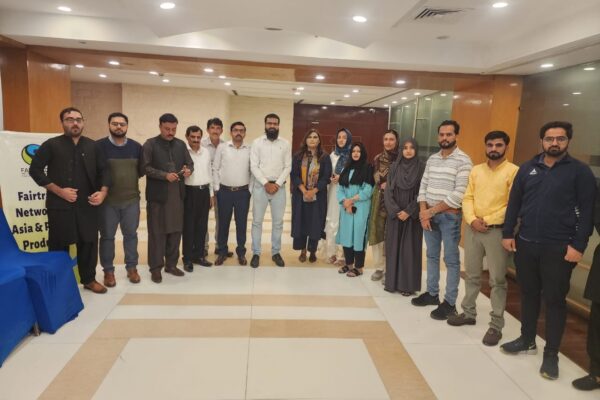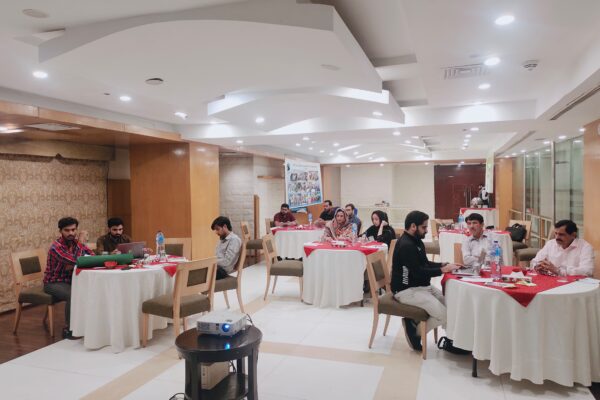Climate change, driven by human-generated greenhouse gas emissions, triggers unprecedented global warming, disrupting weather patterns. Since the mid-20th century, human activities have uniquely impacted Earth’s climate, leading to profound transformations. In Pakistan, where challenges intersect with climate vulnerabilities, issues like widespread poverty, rain-fed agriculture, unequal land distribution, and limited access to resources compound the situation. Effective adaptation involves modifying agricultural practices to counter evolving climate conditions, serving as a crucial defence against the severity of detrimental impacts. This imperative shift addresses the urgent need for resilience in the face of climate-induced risks.

Recognising this, Fairtrade NAPP in collaboration with Fairtrade International organized a 2-day training for Fairtrade Producers for climate change adaptation advocacy on hazards and to develop a pool of trainers for cascading the knowledge in their respective industries and farmers. This training was attended by 20 Fairtrade producers, including 6 female producers. The objectives of the training aimed to promote Fairtrade’s distinctive dual strategy to enhance the resilience of both farmers and industries to climate change. Simultaneously, consumers, retailers, and traders are empowered to reduce their carbon footprint, with the Fairtrade Standard serving as the foundation for these initiatives.
The module for the session was meticulously designed by the Fairtrade NAPP staff in consultation with a trainer consultant, Mr Noman Ashraf. Based on the outcomes of this initial assessment, research and development on climate change, the next step was to develop a comprehensive manual for the participants.
The training with a detailed round of introduction between Mr. Noman Ashraf, and participants to understand their expectations from the training. Afterwards, a reflective exercise was conducted among participants as to how they perceive climate change. An interrelated web diagram was designed as an outcome of the training. The session focused on and discussed the following topics:
- The science of climate change and practical solutions.
- the climate crisis is fuelling a global health crisis.
- Climate and environmental justice around the world.
- Early Warning Systems and Pakistan.
- Ecosystem restoration Climate-resilient infrastructure.
- Effective organizing for climate action.
- Connecting natural and technological climate solutions
The next session was designed to inform the participants of various climate-related challenges in Pakistan, including floods, droughts, heatwaves, and glacial lake outburst floods (GLOFs). The government of Pakistan, in collaboration with international organizations, has been working on establishing and strengthening early warning systems to mitigate the impact of these hazards. The key components for understanding the challenges include the system of meteorological monitoring, hydrological monitoring, communication systems, community engagement, capacity building and integration with disaster management.
The Participants also learned about Pakistan Flood Hazard Maps, Cyclone Hazard Maps, Drought Hazard Maps, Avalanche Hazard Maps, and GLOF Hazard Maps. The trainer also explained the role of the Pakistan Metrological Department, NDMA & PDMAs and all other relevant departments in early warning systems and disaster management. By the conclusion of Day 1, participants gained a comprehensive understanding of the climate hazards specific to their respective sectors. They delved into the intricacies of benchmarking for Greenhouse Gas (GHG) Emissions Calculations, laying the groundwork for the development of baselines for carbon footprints.
 The participants started day 2 with a comprehensive review of Day 1. Following the review, the participants demonstrated elevated motivation and awareness, attributing this to the information and statistics presented during the previous day’s sessions, which underscored the tangible impacts of climate change. In addition, several case studies were discussed that elucidated the risk of climate change if not acted proactively and developed an effective climate action plan that can convert this risk into an opportunity.
The participants started day 2 with a comprehensive review of Day 1. Following the review, the participants demonstrated elevated motivation and awareness, attributing this to the information and statistics presented during the previous day’s sessions, which underscored the tangible impacts of climate change. In addition, several case studies were discussed that elucidated the risk of climate change if not acted proactively and developed an effective climate action plan that can convert this risk into an opportunity.
The session was structured to enable participants to grasp the intricacies arising from the impacts of climate change. Attendees underwent training focused on the development of resilient business strategies, emphasizing the need to foresee, absorb, adapt to, and swiftly recover from climate-related events. The next part on Greenhouse Gas (GHG) Emissions Calculation, focusing on Scope 1, Scope 2, and Scope 3 emissions, was conducted to enhance participants’ understanding and proficiency in measuring and managing their carbon footprint. The training began with an in-depth exploration of the three scopes of GHG emissions.
Armed with practical knowledge and tools, organizations are better equipped to adopt sustainable practices, reduce their carbon footprint, and contribute positively to environmental stewardship. Following this, participants were organized into four distinct groups, each focused on a particular sector: Rice, Dry Fruits, Cotton, and Sports Balls. In the subsequent step, participants engaged in dynamic discussions to generate innovative ideas concerning adaptation and mitigation measures. These ideas formed the basis for the creation of climate action projects that could be tailored and implemented within their sectors. The climate actions were meticulously categorized into short-term, medium-term, and long-term goals, ensuring a comprehensive and sustainable approach to addressing climate challenges. Each group meticulously presented their sector-specific climate action plans, inviting questions and feedback from fellow participants.
The training has yielded valuable insights, emphasizing the participants’ recognition of the significance of contributing to global challenges such as climate change, biodiversity conservation, and unsustainable food production. The escalating frequency of extreme temperatures underscores the urgency of developing both mitigation and adaptation. Participants engaged in hands-on exercises, utilizing real-world data to calculate GHG emissions for their respective organizations. Practical sessions facilitated the application of emission factors, data collection techniques, and the use of emission calculation tools. The training emphasized the integration of emissions calculation into broader sustainability initiatives. By understanding and quantifying their carbon footprint across all scopes, organizations can make informed decisions to reduce environmental impact and contribute to global climate goals. Armed with practical knowledge and tools, organizations are now better equipped to adopt sustainable practices, reduce their carbon footprint, and contribute positively to environmental stewardship. The training’s holistic approach ensures that participants can implement effective emission reduction strategies, aligning their operations with the principles of environmental responsibility and sustainability.
Testimonials:
“Congratulations to NAPP on completing another very well-arranged, managed and articulated training session for Fairtrade producers. We believe this will play a very vital role for these industries/producers in their sustainable growth and We are thankful to NAPP and appreciate continuous support work.” – Malik Jameel, Vision Technologies
“It was indeed a great learning experience and a revision of already acquired learning about Environmental standards and would plan to replicate it in our set-up.” – Abdul Majeed Chaudhry, hope Farmers Association.
“I am happy to become part of the climate change training as we experienced Flooding in Gilgit and it was good to learn the Preparedness strategy for dealing the issue in future as well.” – Farzana Bibi, Mountain Fruits (Pvt) Limited








